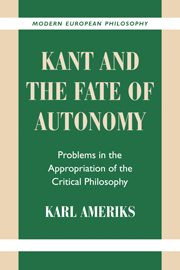Book contents
5 - Kant, Fichte, and Apperception
Published online by Cambridge University Press: 05 June 2012
Summary
FICHTE S LEGACY AND CONTEMPORARY THEORIES OF APPERCEPTION
The Fichtean strand in the development of post-Kantian philosophy is rooted from the very start in a fundamental duality in Fichte's creative use of the basic Kantian notion of the “I think.” On the one hand, when Fichte reinterpreted this “fact of consciousness” as an original “act” (Tathandlung rather than Tatsache), he eventually incorporated it into a popular – but, as I have argued, questionable – radicalization of the doctrine of the “primacy of practical reason,” a radicalization that put pure practical philosophy at the base of all philosophy. On the other hand, Fichte also used his “active” understanding of the “I think” as part of a reconceptualization (especially in his earliest works) of the nature of pure theoretical reason. It is this second side of Fichte's influence, which is independent of action in an ordinary practical or moral sense, that I will be focusing on here.
Although Kant is also well known for having discussed thinking, even in its purest theoretical sense, as an “activity” rooted in the unique spontaneity of subjectivity, he did not directly develop a complete account of subjectivity as such. Following immediately upon Reinhold's focus on a general faculty of representation (Vorstellungsvermogen), Fichte insisted on such an account, and from the beginning he put a special stress on the bare notion of self-consciousness as a synthetic activity of apperception that is indispensable to “scientific philosophy” as such, that is, to anything like a Wissenschaftslehre or systematic theory of subjectivity.
Information
- Type
- Chapter
- Information
- Kant and the Fate of AutonomyProblems in the Appropriation of the Critical Philosophy, pp. 234 - 264Publisher: Cambridge University PressPrint publication year: 2000
